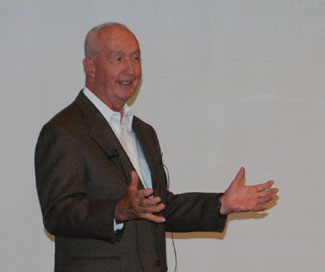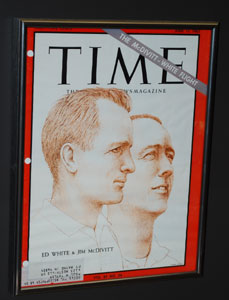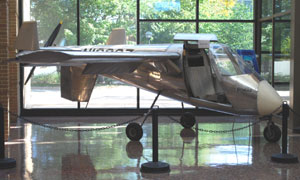Moon Rocks, Risk-Taking and How Not to Get Killed in Space
On any given day, it’s impossible to attend every single special lecture or event hosted at the University of Michigan. It’s even tough to keep track of what’s happening without feeling exhausted.
But when a Chronicle reader alerted us to astronaut Jim McDivitt‘s lecture on Friday and expressed regret that she wasn’t able to attend, that was enough to launch us into action.
It propelled us all the way to UM’s North Campus and its François-Xavier Bagnoud (FXB) building, where the aerospace engineering department is housed. An admission: Here at The Chronicle, we’re not aerospace engineers. That’s why we went with some trepidation that McDivitt’s lecture would be a difficult one, if not downright boring.
Our worries were allayed when McDivitt walked into the building’s corridor with a posse of College of Engineering folks and stopped by the sizeable permanent display there in his honor. “There’s the moon rock, yep,” he said, looking at what seemed like a small chunk of gravel encased in a clear plastic box, which was covered with a film of dust. “Come on, Tony,” he quipped, turning to Tony England, CoE’s associate dean of academic affairs. “Get this damn thing cleaned up!”
From that we learned that the 79-year-old McDivitt is 1) funny, and 2) not one to mince words. His lecture reflected those qualities, and gave his audience a window into NASA’s glory days of space exploration. Here are some highlights:

Jim McDivitt, an astronaut on several Gemini and Apollo missions, shared his thoughts Friday at a lecture on North Campus.
• “Flying in space is not safe and never will be.” He related some rather harrowing stories about near-misses and seat-of-the-pants fixes – or “real-time engineering” – done on various space missions. One of them involved two men with broomsticks. Seriously. (And McDivitt still has one piece of the broomstick mounted on a plaque.) Another tale involved the first space-walk mission with Ed White, when they weren’t able to close the hatch and had to work in the dark to fix it – or else face burning up on re-entry.
• The point of those stories is this: “We were risk-takers,” McDivitt says, referring to both his colleagues and the nation as a whole. Today, in sharp contrast, “we want to sue each other all the time and we want to fix blame.” It’s all about assessing risks and rewards – and these days, he said, we don’t have the moral fiber to take the kinds of risks that manned space travel entails. “I’m not sure the country today are risk-takers – except maybe in financial management.”
• Ethics: The College of Engineering should take a leadership role in teaching ethics to its students, McDivitt says. They’ll encounter situations in their work and in business that will test their convictions, and they need to have high standards for dealing with ethical dilemmas.
• Fixed-wing pilots – who, McDivott says, “really know how to fly,” refer to astronauts as “garbage can pilots.” McDivott, of course, was both.
• McDivitt lived through the days when astronauts were hailed as heros and given parades upon their return. He also witnessed the nation’s decline in interest: During the last mission he led – Apollo 14, in 1971 – the crew had landed on the moon but the three major TV networks were airing baseball, golf and a soap opera. “The bloom was off the rose,” he said.
• McDivitt went to UM on an Air Force scholarship after fighting in the Korean War, and graduated in 1959 with a degree in aeronautical engineering. (One of his former professors was in the audience at Friday’s lecture.) He has served on the College of Engineering’s national advisory board, and funded an endowed scholarship for the college.
• Before his talk, McDivitt presented UM structural engineering student Heather Muñoz with one of those giant photo-opp checks for $10,000 – a prestigious scholarship awarded by the Astronaut Scholarship Foundation.





